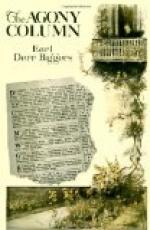You did not know it, of course; but in those words you passed me a challenge I could not resist; for making plots is the business of life—more, the breath of life—to me. I have made many; and perhaps you have followed some of them, on Broadway. Perhaps you have seen a play of mine announced for early production in London. There was mention of it in the program at the Palace. That was the business which kept me in England. The project has been abandoned now and I am free to go back home.
Thus you see that when you granted me the privilege of those seven letters you played into my hands. So, said I, she longs for mystery and romance. Then, by the Lord Harry, she shall have them!
And it was the tramp of Captain Fraser-Freer’s boots above my head that showed me the way. A fine, stalwart, cordial fellow—the captain—who has been very kind to me since I presented my letter of introduction from his cousin, Archibald Enwright. Poor Archie! A meek, correct little soul, who would be horrified beyond expression if he knew that of him I had made a spy and a frequenter of Limehouse!
The dim beginnings of the plot were in my mind when I wrote that first letter, suggesting that all was not regular in the matter of Archie’s note of introduction. Before I wrote my second, I knew that nothing but the death of Fraser-Freer would do me. I recalled that Indian knife I had seen upon his desk, and from that moment he was doomed. At that time I had no idea how I should solve the mystery. But I had read and wondered at those four strange messages in the Mail, and I resolved that they must figure in the scheme of things.
The fourth letter presented difficulties until I returned from dinner that night and saw a taxi waiting before our quiet house. Hence the visit of the woman with the lilac perfume. I am afraid the Wilhelmstrasse would have little use for a lady spy who advertised herself in so foolish a manner. Time for writing the fifth letter arrived. I felt that I should now be placed under arrest. I had a faint little hope that you would be sorry about that. Oh, I’m a brute, I know!
Early in the game I had told the captain of the cruel way in which I had disposed of him. He was much amused; but he insisted, absolutely, that he must be vindicated before the close of the series, and I was with him there. He had been so bully about it all. A chance remark of his gave me my solution. He said he had it on good authority that the chief of the Czar’s bureau for capturing spies in Russia was himself a spy. And so—why not a spy in Scotland Yard?
I assure you, I am most contrite as I set all this down here. You must remember that when I began my story there was no idea of war. Now all Europe is aflame; and in the face of the great conflict, the awful suffering to come, I and my little plot begin to look—well, I fancy you know just how we look.




